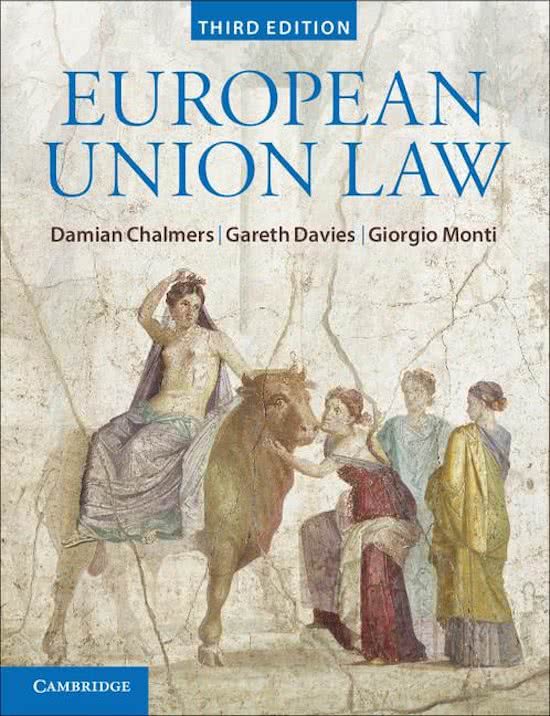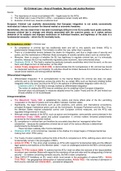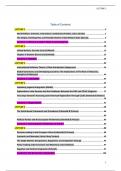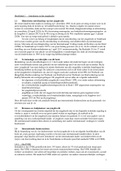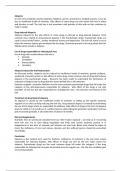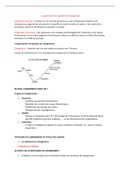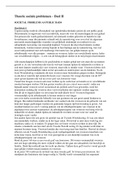Issues:
1. The importance of mutual trust between MS – fragile basis for the AFSJ.
2. The limited role in Law of the EU in AFSJ – competence remain mostly with MS’s.
3. Evolution of blind trust, towards conditional trust.
European Criminal Law explicitly demonstrates that European integration is not solely economically
motivated as it does not concern the Internal market or economic freedoms.
Nonetheless, this has meant that it has been increasingly difficult for the EU to justify such public authority,
because criminal law is strongly and directly associated with the coercive power, as it makes serious
demands of its subjects and imposes restrictions on individual freedom, and legitimacy of the state is a
fundamental necessity – which the EU inevitably lacks.
EU Competence Limited in Criminal Law:
• EU competence in criminal law has traditionally been and still is very specific and limited: AFSJ is
predominantly Intergovmental. This limitation is within the Law, rather than in practice.
• There is a fundamental tension between the desire for integration, and thus a single area of security and
justice, and the maintenance of Member State sovereginty of socially sensitive area’s such as criminal law.
• Moreover, there is concern of whether the EU has legitimacy to regulate criminal law, as it is intrinsically
sensitive, whereas the EU has traditionally regulated purely economic, less-controversial areas.
• Chalmers (2015) → ‘This field is marked by particular domestic sensitivities which limit its remit, on the one
hand, and shape its form of intervention, on the other’
• Lisbon Treaty Judgement 2 (BvE 2/08) → demonstrates that EU competences in EU criminal law should
be interpreted restrictively and implicitly, its activities should be limited, because EU criminal law touches on
valued social relations and strong political identities.
Differentiated Integration:
• Differentiated Integration → In contradistinction to the Internal Market, EU criminal law does not apply
uniformly and is not homogenous across the entire EU, as certain MS’s such as Denmark inhibited further
integration within this area, and thus the AFSJ is the epitome of differentiated integration within the EU.
- Chalmers (2015) → ‘this field is strongly marked by differentiated integration’.
- The notion of creating the AFSJ was an ambitious aim for enabling further European integration.
- Denmark does not participate in measures adopted since the Lisbon Treaty and the UK and Ireland can
choose whether or not to participate.
Intergovmentalism:
• The Maastricht Treaty 1992 → established the Justice and Home affairs pillar of the EU, permitting
‘cooperation in the field of justice and home affairs’ between member states.
• Significantly, the legal instruments such as joint positions, joint actions and international conventions,
excluded European institutional actors such as the Commission, European Parliament and the ECJ. Thus,
the Member States retained substantial control over European criminal measures, and the AFSJ was
regulated Intergovmental in nature.
• Although certain aspects of the AFSJ, such as asylum and immigration, were partially communitarised in the
Amsterdam Treaty (1999), police and judicial cooperation in criminal matters remained predominantly
governed by the Intergovmental method.
• EU competence in criminal law can therefore be accurately described as ‘managerial rather than
substantive’ – because the substantive criminal law on each of the various offences is determined
predominantly by domestic law.
- There has been relatively little Communitarisation.
• Chalmers (2015) → EU criminal law ‘operates in the shadow of a longer legacy of Intergovmental law-
making than other TFEU policy’.
• The Treaty of Lisbon explicitly outlines the limits of the EU’s competence in AFSJ, defining area’s which must
fundamentally remain in the prerogative of MS’s.
• Article 67 TFEU → ‘The Union shall constitute an AFSJ with respect for fundamental rights and the different
legal systems and traditions of the Member states’ – must not challenges/undermine the MS’s criminal justice
systems.
• Article 74 TFEU (Lisbon 2008) → outlines that the AFSJ ‘shall not affect the exercise of the responsibilities
incumbent upon member States with regard to the maintence of law and order and the safeguarding of internal
security’ – In matters concerning domestic security, the MS’s retain competence.
• Other EXPLICIT limitations on EU, area’s which must remain in the prerogative of national MS’s - Article
77(4) TFEU – the geographical demarcation of national borders, Article 79(5) – the volumes of admission of
third-country nationals and Article 83(3) – procedural safeguards.
, • Therefore, as Chalmers (2015) argues → ‘the language of national sovereginty and identity correspondingly
exercise a powerful influence on EU law in this field’.
• Article 4(2) TEU → ‘The union shall respect their essential State functions, including ensuring the territorial
integrity of the state, maintaining law and order and safeguarding national security…in particular, national
security remains the sole responsibility of each Member State’.
- This demonstrates that EU criminal law is subject to particular sensitivities of the Member States, whereby
EU law will only intervene in the most exceptional circumstances.
• Moreover, it gives MS a monopoly over national security, and as Chalmers (2015) → appreciates ‘national
security shapes the remit and operation of EU criminal law, with national institutions restricting it wherever
they believe its activities intrude into matters better categorised as ones of security’.
- The National institutions determine the scope of EU criminal Law – which is dependent upon the
determination of national security, which should not be confined to narrow technical range of activities.
National controls over the law-making process:
• Moreover, a number of institutional checks are enforced against EU criminal Law.
• Under Article 76 TFEU → When there is one-quarter of Member States, they share the power of initiative
with the Commission. Thus the commission does not have a monopoly of initiative and MS can control EU
criminal law directly.
• Under Article 82(3) TFEU → ‘Emergency Brake’ procedures allow any MS to refer a proposal affecting
fundamental aspects of its criminal justice system to the European Council.
- If a reference has occurred, then it is likely to lead to the measure not being adopted. Because it would
need the Head of State to agree to an EU measure which her own government has already stated effects
of fundamental aspects of the national criminal justice system.
- So, therefore, the MS’s do have a huge amount of control over the legislation under EU criminal Law
• Article 69 TFEU → One-quarter of National parliaments can ask the Commission to reconsider a proposal
for failure to comply with the subsidiarity principle. NP’s regulate the area of subsidiarity in EU criminal
proceeds rigorously.
- As Chalmers (2015) appreciates, usually requires 1/3rd, and therefore this ‘lower threshold’ recognises
‘a higher domestic sensitivity to union intervention.
The ECJ’s revolution (intervention) – The ECJ has consistently attempted to expand the authority of the EU,
in the AFSJ
• The ECJ has, as in many other areas of EU Law, actively challenged the legal boundaries of the Treaty, by
consistently attempting to establish its own authority over EU criminal Law, through permitting the EU to act
in areas where there is a mere relationship between criminal law and the internal market.
- The ECJ has been intrinsically permissive of the EU’s formal, legal competence in AFSJ.
- This is despite/irrespective of the clear tension between sovereginty and further integration.
• In Pupino C-105/03 → the ECJ attempted judicial ‘Communitarisation’ of criminal matters.
• This is demonstrated in Commission v Council C-176/03 (Environmental Crimes) → in which the ECJ held
that the Law, does not prevent “the Community legislature…from taking measures which relate to the criminal
law of the Member States which it considers necessary in order to ensure that the rules which it lays down on
environmental protection are fully effective.”
• As well as in Commission v Council C-440/05 – concerning ship-source pollution.
• The ECJ in Gestoras Pro Amnistia and Others v Council C-354/04 → held that preliminary rulings are
possible, irrespective of the fact that formally the EU’s jurisdiction is excluded.
• All these cases demonstrate that it has been difficult to contain the ECJ, as the institution has often attempted
to extend the EU’s competence in criminal matters beyond the treaty and thus the boundaries of acceptability.
• This is particularly problematic as it insufficiently appreciates/considers the delicate balance that must
necessarily be struck between the competing tension of preserving national sovereignty and integration, as it
consistently prioritises the latter.
• This is irrespective of the Treaty’s recognition of this balance = Article 67 TFEU → ‘The Union shall constitute
an AFSJ with respect for…the different legal systems and traditions of the Member states’ – must not
challenges/undermine the MS’s criminal justice systems.
Greater Power conferred on EU: Increasingly, MS have agreed to confer more powers/greater acceptance on
the EU to permit criminal law co-operation:
• The Lisbon Treaty 2008 → enabled the AFSJ to transition from an Intergovmental aspirational project, to
forming a fundamental aspect and basis of the Treaty. Article 3(2) TEU outlines that ‘The union shall offer its
citizens an area of freedom, security and justice without internal frontiers…with appropriate measures’ such
as ‘the prevention and combating of crime’.

